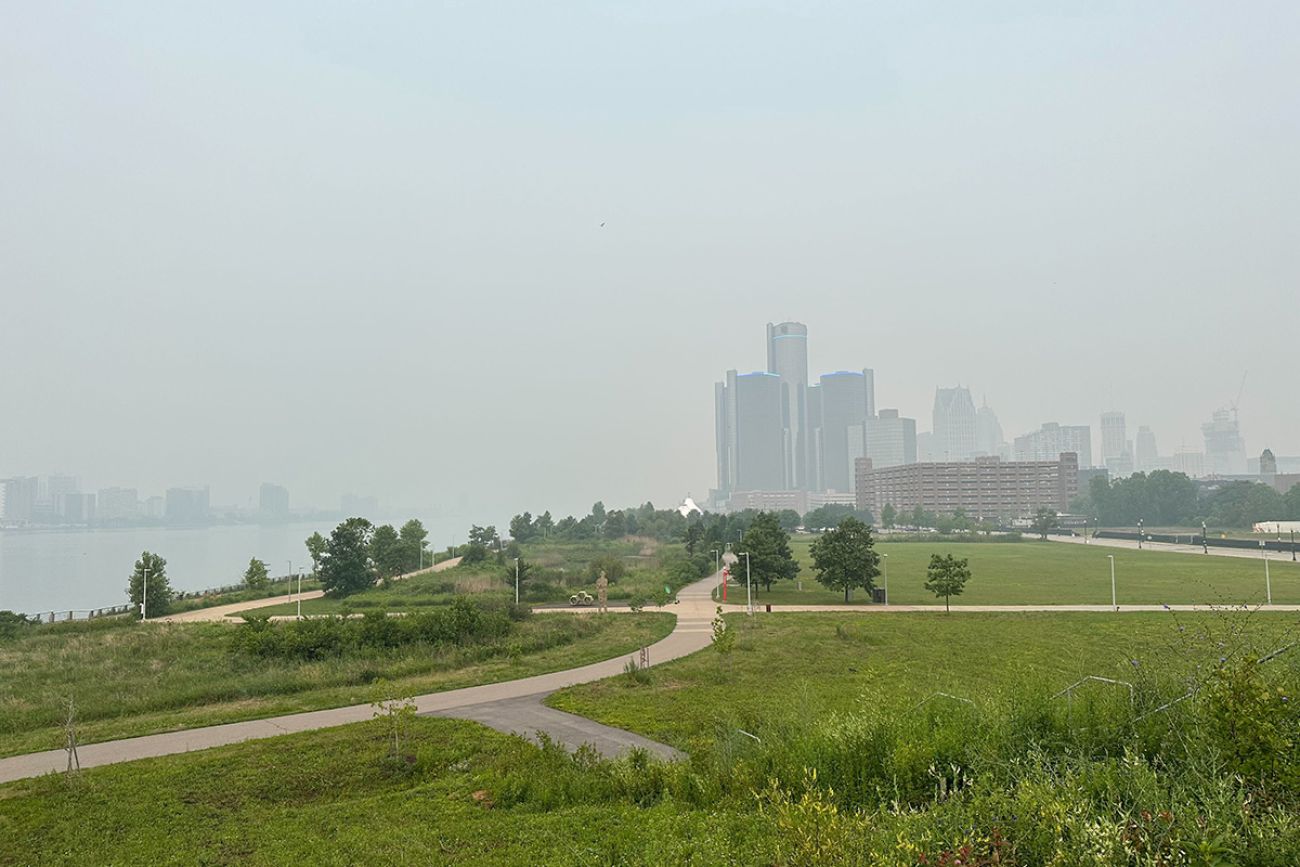Air quality warning pushed to Friday in Michigan; doctors urge outdoor limits

- With the holidays approaching, Michigan doctors are advising even healthy people to limit their time outdoors.
- Ann Arbor, Lansing and Detroit were within the top 10 most polluted U.S. cities Thursday because of the smoke
- The Canadian wildfires producing the smoke have scorched nearly 20 million acres of land
June 30: Air quality, heavy traffic will impact Michigan travel over holiday weekend
With wildfire smoke still adrift throughout the state this holiday weekend, Michiganders should reconsider plans for extended time outdoors, some doctors warn.
“You can’t have your s’mores indoors, right?” said Dr. Delicia Pruitt, a Saginaw-Bay City area primary care doctor who is also medical director for Saginaw County.
“But you can limit the outdoor time, and have some of your activities indoors,” said Pruitt, an asthma sufferer, herself.

The heaviness and irritation Pruitt feels in her own lungs is similar to the complaints she’s receiving from patients, she said. So Pruitt is boosting the strength of inhalers and prescribing steroids, she told Bridge, even as her voice cracked, she said, from the respiratory irritation.
Related:
- Michigan under statewide advisory as Canada wildfire smoke hits Midwest
- Record 1.7M Michigan residents to hit road for Independence Day: What to know
- Michigan fireworks: Fire danger continues, prompting cancelation fears
- Great Lakes water temperatures warming up ahead of Fourth of July weekend
Unhealthy conditions will last at least one more day for millions of Michiganders, from smoke from ongoing wildfires in eastern Canada. Wind currents have pushed the smoke — and the harmful pollutants it contains — toward the Midwest, where it has lingered for three consecutive days.
“You can feel it. You get this palpable taste in the back of your mouth,” said Dr. Matthew Karulf, a specialist in pulmonology and critical care medicine at UP Health System-Marquette.

“It’s the particulate matter — it’s like second-hand smoke,” agreed pulmonologist and allergist Dr. Devang Doshi at Corewell Health’s Royal Oak hospital.
The smoke is impacting over a dozen Midwest and eastern states, amounting to over a third of the U.S. population under an air quality advisory.
On Thursday morning, the Michigan Department of Environment, Great Lakes, and Energy extended its statewide air quality advisory through Friday.
Many areas of southern Michigan are experiencing “very unhealthy” levels of air pollution. As of 12 p.m. Thursday, Ann Arbor was registering an ozone and pollution air quality index (AQI) of 260 — the highest in the United States.
Detroit and Lansing are also within the country’s top 10 AQI locations.
The air over the Upper Peninsula and northern Michigan has largely cleared, though some areas remain unhealthy for sensitive groups — including people with asthma, elderly adults and young children.
Some hospitals, including at least five Corewell Health hospitals and DMC Huron Valley-Sinai Hospital in Commerce Township, are noting a slight uptick in patients seeking care for respiratory problems, but Karulf in Marquette said he suspects more people, especially those with underlying health conditions and inhalers, are experiencing symptoms and assuming their breathing difficulties are spring allergies.
“If you can see the air, that’s not a good thing,” Dr. Ikenna Okereke, of Henry Ford Health, told reporters Friday.
“We know the best method in this case is prevention and limiting exposure, … especially when you see air indexes at 200 or higher… I know this is very inconvenient but these levels are high.”
Especially vulnerable are smokers and people with chronic conditions, such as asthma and or chronic obstructive pulmonary disease (COPD). For them, pollutants trigger already inflamed mucosa, the tissue that lines the respiratory tract, said Dr. Lawrence MacDonald, chief of pulmonary medicine at Huron Valley-Sinai Hospital.
“The mucosa is hypersensitive. They are cells that are ready and primed … for an exaggerated response,” to pollutants, he said.
Michiganders with breathing problems should stay inside as the air quality worsens and make sure they have inhalers on hand. If they develop breathing difficulties, they should contact their primary care doctor immediately.
And he added: “Spend (the time) inside, but not inside smoking.”
In healthy people, temporary smoke inhalation is not likely to cause long-term damage. Still, it’s not without effect, and even healthy people should consider limiting exposure. That means skipping the outdoor run, and doing an indoors workout instead, he said.
A day’s worth of air quality that rises to 350, he said, is equivalent to a half-pack of cigarettes.
This has been Canada’s worst wildfire season in modern history, having burned over 19 million acres of land so far. Officials say nearly 260 of the over 500 active fires in Canada are “out of control.”
Michiganders can protect themselves by limiting time outdoors, wearing an N95 or equivalent mask outside, keeping windows and doors closed and ensuring that their homes are well-ventilated.
You can check the air quality index in your area here. You can sign up for air quality action alerts through EnviroFlash.
Michigan Environment Watch
Michigan Environment Watch examines how public policy, industry, and other factors interact with the state’s trove of natural resources.
- See full coverage
- Subscribe
- Share tips and questions with Bridge environment reporter Kelly House
Michigan Environment Watch is made possible by generous financial support from:
Our generous Environment Watch underwriters encourage Bridge Michigan readers to also support civic journalism by becoming Bridge members. Please consider joining today.
See what new members are saying about why they donated to Bridge Michigan:
- “In order for this information to be accurate and unbiased it must be underwritten by its readers, not by special interests.” - Larry S.
- “Not many other media sources report on the topics Bridge does.” - Susan B.
- “Your journalism is outstanding and rare these days.” - Mark S.
If you want to ensure the future of nonpartisan, nonprofit Michigan journalism, please become a member today. You, too, will be asked why you donated and maybe we'll feature your quote next time!






